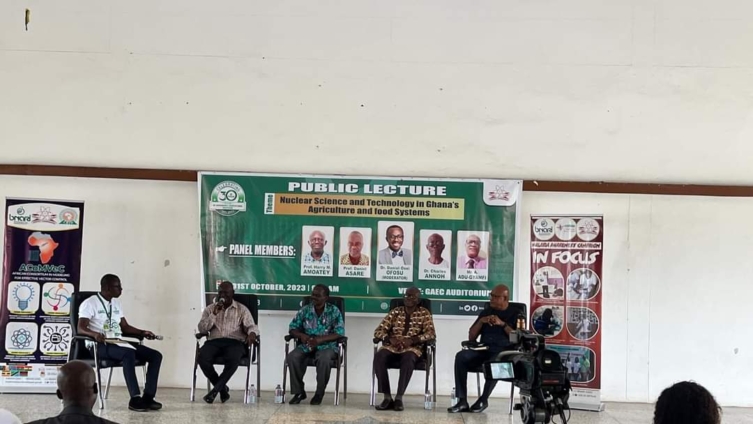Chief Research Scientist at the School of Nuclear and Allied Sciences, Abraham Adu-Gyamfi, has emphasised the crucial need for farmers and food exporters to adopt food irradiation as a means of preserving and extending the shelf life of food crops.
A recent study conducted by the Denmark Embassy in Ghana revealed alarming statistics: approximately 50% of crops harvested in Ghana go to waste, resulting in a staggering loss of over $16 million due to post-harvest losses of selected food crops. This revelation underscores the urgency to address this issue effectively.
Mr. Adu-Gyamfi, speaking after a Public Lecture on Nuclear Science and Technology in Ghana’s Agriculture and Food Systems, highlighted the potential of food irradiation in curbing these losses and enhancing food security in the country.
He emphasised, "Food irradiation will enable us to eliminate pathogenic and spoilage microorganisms from food. Moreover, it can significantly reduce the levels of insects in maize and cereals."
Again, he stated that this method could effectively delay the ripening of fresh produce, enabling fruits to stay fresh for an extended period, which is essential for reaching markets where fresh products are in demand.
Furthermore, the process can inhibit sprouting in areas where rhizomes and bulbs are prevalent, consequently extending the shelf lives of these crops.
Regarding the accessibility of the technology, Mr. Adu-Gyamfi mentioned that their institution has organised various educational activities, including food fairs and site visits, aimed at sensitising farmers and other stakeholders.
He noted, "We have conducted food fairs where farmers have had the opportunity to taste irradiated foods. Additionally, we encourage producer groups to visit the Atomic Energy Commission to understand the functions of the facility."
In Africa, concerns about nutrition and food security remain paramount, especially with the continent's burgeoning population.
The issue of food loss and waste is particularly urgent. It's estimated that each year, a substantial percentage of grains, root crops, and fruits and vegetables are destroyed, impacting agricultural sustainability.
Smallholder farmers and local producers, the backbone of the agricultural sector, face financial setbacks due to increased produce losses, which restrict the availability of food.
By adopting food irradiation techniques and increasing awareness among stakeholders, Ghana stands to significantly reduce post-harvest losses, ensuring a more sustainable and efficient agricultural system for the future.
Latest Stories
-
Paris 2024: Opening ceremony showcases grandiose celebration of French culture and diversity
3 hours -
How decline of Indian vultures led to 500,000 human deaths
4 hours -
Paris 2024: Ghana rocks ‘fabulous fugu’ at olympics opening ceremony
4 hours -
Trust Hospital faces financial strain with rising debt levels – Auditor-General’s report
5 hours -
Electrochem lease: Allocate portions of land to Songor people – Resident demand
5 hours -
82 widows receive financial aid from Chayil Foundation
5 hours -
The silent struggles: Female journalists grapple with Ghana’s high cost of living
5 hours -
BoG yet to make any payment to Service Ghana Auto Group
5 hours -
‘Crushed Young’: The Multimedia Group, JL Properties surprise accident victim’s family with fully-furnished apartment
6 hours -
Asante Kotoko needs structure that would outlive any administration – Opoku Nti
6 hours -
JoyNews exposé on Customs officials demanding bribes airs on July 29
7 hours -
JoyNews Impact Maker Awardee ships first consignment of honey from Kwahu Afram Plains
8 hours -
Joint committee under fire over report on salt mining lease granted Electrochem
8 hours -
Life Lounge with Edem Knight-Tay: Don’t be beaten the third time
8 hours -
Pro-NPP group launched to help ‘Break the 8’
9 hours

